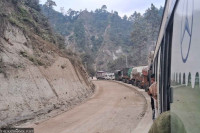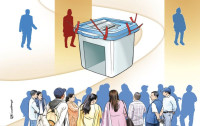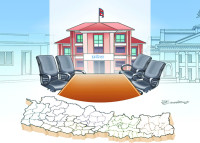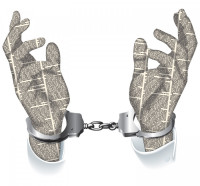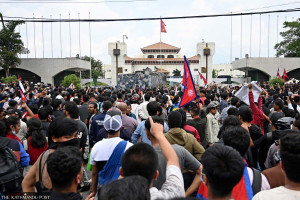Opinion
Keep your promises
Any attempt to pursue decentralisation instead of federating the country would be manipulative politics
Prakash Bom
The political parties that signed the Comprehensive Peace Agreement in 2006 and later declared Nepal a secular, federal, democratic republic as laid out in the Interim Constitution cannot denounce their commitment at this point. If they do so, then it will not only be a betrayal to the nation and its people, but will also raise questions about their political integrity, which will inevitably invite political instability.
For that reason, the Carter Center, which was actively involved in Nepal’s peace process and in both Constituent Assembly elections, has called for consensus politics, urging political parties to respect their commitments. That is to say, the agreements on state restructuring for implementing federalism must be consolidated with the peace process and the spirit of the Interim Constitution on the basis of consensus. Past agreements with various stakeholders cannot allow the state-restructuring process to take place as dictated by the common proposal of the ruling parties, which seems to be an attempt to implement decentralisation of the current unitary government system with regional units devoid of the right to self-determination for regional autonomy, as should be guaranteed under federalism.
Prolonging the status quo
In other words, the state restructuring adjudication must guarantee the federated states’ rights to self-determination for regional autonomy, under which every local unit has the right to supervise its units. This means, under the constitution of the federal democratic republic of Nepal, the federal states or regions are permitted to form their own legislature, executive, and judiciary bodies of the state government, independent of the unitary (central) control mechanism of hierarchy. This is a crucial prerequisite of federalism. However, it seems that forces are at play to instead uphold the status quo all over the nation, doing away with past agreements and provisions of the Interim Constitution. There is an attempt to enforce the polity of exclusion, in spite of demands for fundamental change.
For instance, the recent national gathering of judges did not even bother to discuss in detail the different structures and roles of the judiciary and the court system after federalism. Instead, the gathering proceeded with the unitary judiciary system agreements, ignoring the challenge of state restructuring adjudication in the new constitution.
Judicial matters
That is to say, if federalism is to be implemented, then it permits federal states to choose their own judiciary system independent of the Judicial Council (JC) of the central government, or choose a judiciary system similar to that of India or France, where an independent body dislodged from the executive and legislative bodies of the government administers the entire court system. Nonetheless, in both cases, the judiciary’s independence is fundamental to deliver justice. But, the current unitary judiciary system of Nepal—as the national gathering of judges have insisted to carry on—if not restructured, as per one of the systems to implement federalism, cannot have judicial independence to deliver justice. If the proposed structure of the JC is to be endorsed to administer the entire court system of a federal Nepal, the Council cannot be comprised of representatives from the legislative or executive bodies of the central government. Only then will parliamentary hearings of judges be irrelevant. Even so, as long as judges are nominated by the executive heads of the government with the recommendation of the JC, comprised of the law minister, holding a parliamentary hearing is a democratic practice.
Who heads government?
Likewise, the reason behind the reluctance of senior leaders of the ruling political parties to sanction the provision for a directly-elected executive head of government in the new constitution is apparent to the young generation. Obviously, this provision will do away with the chances of senior leaders waiting in queue to become the next prime minister. If this provision, however, is endorsed under even the current parliamentary political system, it will then not only make the system stable but will also give voters a chance to elect an individual candidate who is capable and charismatic enough to lead the nation.
Therefore, contentious issues such as these, if not endorsed in the new constitution, ought to be petitioned to be put to a vote in the next general elections. The opposition can propose this.
What matters most in tackling contentious issues of the new constitution is federalism, which provides the right of self-determination to federal units, doing away with the current unitary system that is widely exclusive and densely corrupt from the top to the bottom. Any attempt to only decentralise the current unitary government system, instead of federating the country, would be manipulative politics. It would be nothing more than an act of political deception.
Bom is associated with the Non-Resident Nepali Association, New York, the US




 5.44°C Kathmandu
5.44°C Kathmandu
